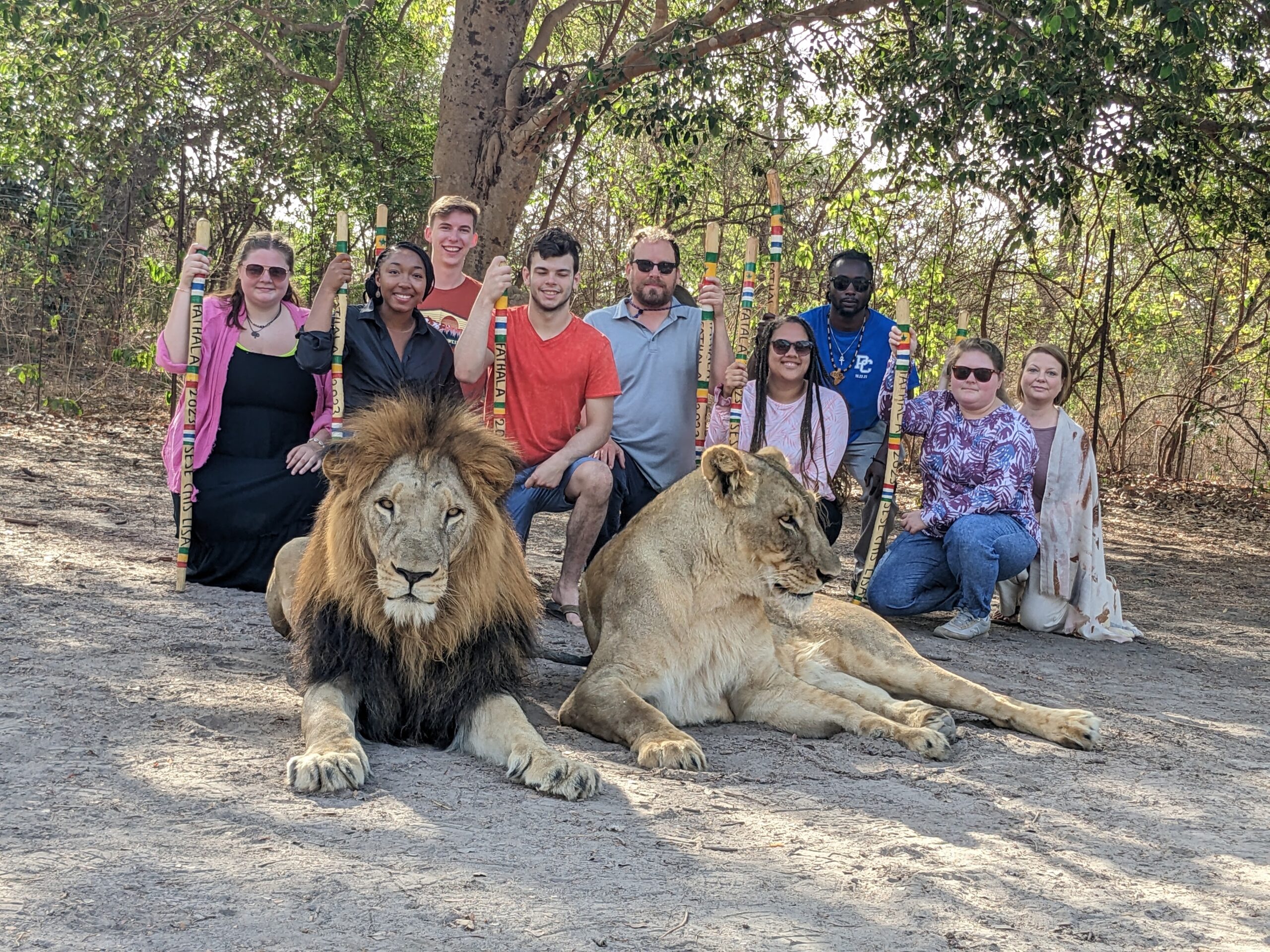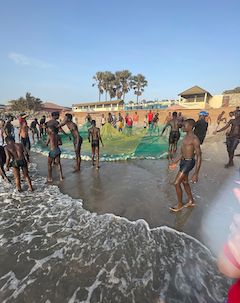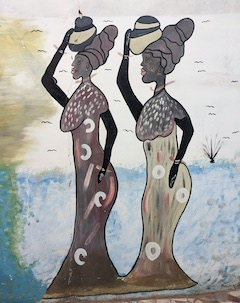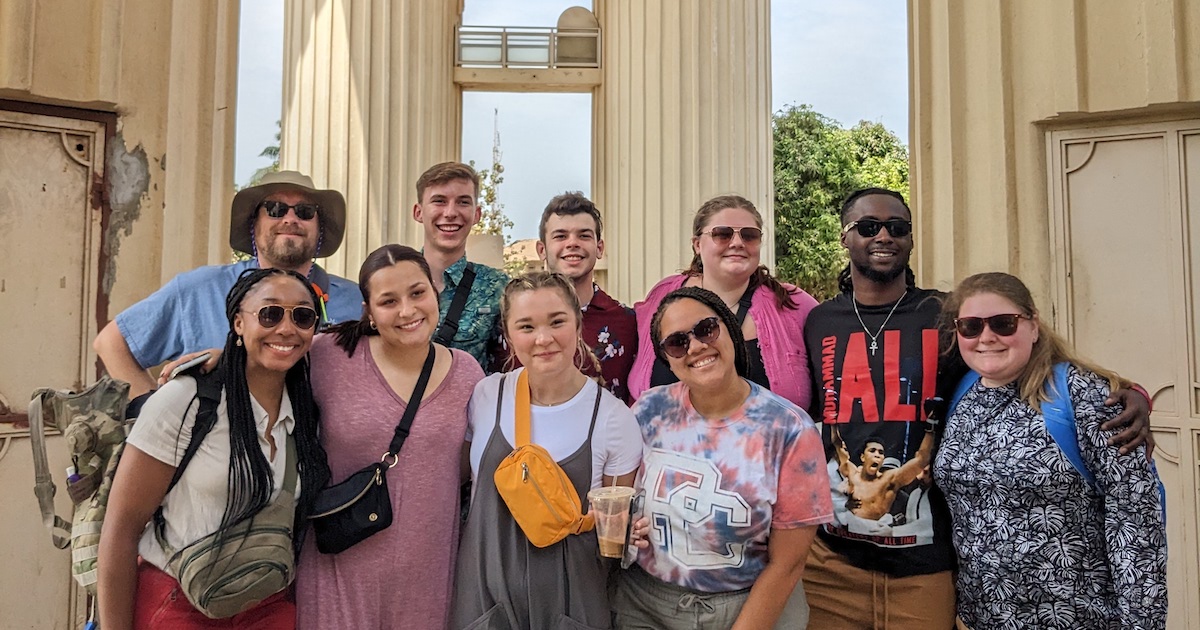Benachin and Democratization: Nine PC students experience a transformative Maymester in the Gambia

The group traveled to The Smiling Coast for two weeks in May to witness firsthand how the country is building a democracy following two decades of dictatorship
by Sarah Murphy
Help haul in fish off the coast of West Africa. Get paid in fish.
This was the unexpected exchange a group of Presbyterian College students encountered during their two-week Maymester trip to the Gambia last month.
 The students were visiting the famed Bijilo National Park, known for its coastal forest trails and population of endangered red colobus monkeys. After making their way through the forest to the ocean, the PC students were greeted by a large group of fishermen — kids and young adults — who were hauling in nets they had set out earlier.
The students were visiting the famed Bijilo National Park, known for its coastal forest trails and population of endangered red colobus monkeys. After making their way through the forest to the ocean, the PC students were greeted by a large group of fishermen — kids and young adults — who were hauling in nets they had set out earlier.
The fishermen invited Xavier Nance ‘23 and Dakota Price ‘25 to join them in their work, tugging a sea-soaked rope through the surf and dragging large green and yellow nets full of fish up onto the shoreline.
“Gambians are incredibly welcoming and invite you into their world, into whatever they’re doing,” said associate professor of political science Dr. Ben Bailey and one of the faculty members who led the Gambian trip. “They don’t see you as a tourist or Westerner.”
With the nets spread out across the sand and fish collected, the PC students turned to leave. But a Gambian fisherman, Captain Umbrion, insisted they take fish with them as payment for their contribution.
“The students getting paid in fish — that was the first time anything like that had happened to me on a trip,” said associate professor of political science Dr. Justin Lance, who traveled to the Gambia himself as an undergraduate. “It’s really telling of the community-centered culture; everyone who helps haul in the fish keeps some of the fish.”
Nance and Price graciously took the fish, bringing it back to their tour guide, Sidibeh.
This impromptu experience wasn’t on the Maymester agenda, and yet, it speaks volumes: about the Gambian people, what can come of completely submerging oneself in a new culture, and the overall transformational two weeks PC students spent in the Gambia.
Visiting The Smiling Coast
The Gambia cuts through the middle of Senegal in West Africa. Hugging the banks of the River Gambia, the country is known as “The Smiling Coast,” a nod to the shape of the curve where the river meets the ocean, almost as a smiling greeting.
 Nine PC students came together for the Gambian Maymester, most political science majors. They were led by Bailey, Lance, and associate professor Dr. Erin McAdams, who together taught two academic courses: “Democratization in Africa” and “Truth and Reconciliation in Post-Conflict Societies.” The former examined the process African nations go through in becoming democracies, and the latter examined the truth and reconciliation process, especially the process ongoing in the Gambia today as they work to repair the damage done by over two decades of harmful dictatorship.
Nine PC students came together for the Gambian Maymester, most political science majors. They were led by Bailey, Lance, and associate professor Dr. Erin McAdams, who together taught two academic courses: “Democratization in Africa” and “Truth and Reconciliation in Post-Conflict Societies.” The former examined the process African nations go through in becoming democracies, and the latter examined the truth and reconciliation process, especially the process ongoing in the Gambia today as they work to repair the damage done by over two decades of harmful dictatorship.
The PC students were able to combine pre-and-post travel meetings, academic coursework, and on-ground travel to earn a total of six political science credit hours during the trip.
“The Gambia is a good introduction to West Africa, and it’s an incredible case study for students,” said Lance. “The country is working through this reconciliation at breakneck speeds, within just five years of the previous regime falling. Coming to the Gambia and witnessing these events firsthand makes our students better democratic citizens and better world community members.”
During the trip, the PC group visited a number of historical and cultural sites, including the National Museum in Banjul, The Memory House and the Bakou crocodile pond. They spent a day at the beach with students from the University of Gambia and visited a local village to have Benachin, a traditional Gambian meal, while conversing with a farmer and his family.
“This Maymester trip really opened our students’ eyes to things they may not have the opportunity to experience otherwise,” said Lance.
Moments of Discovery and Deep Reflection
Two site visits were particularly impactful in the eyes of the PC students.
The Memory House is a museum just outside the Gambia’s capital dedicated to the victims of the former regime.
“I felt that I came to understand the true meaning of resilience during our trip,” said Kennedy Wright ‘23. “The Gambia’s former president committed egregious human rights violations. These violations still linger and affect the lives of many Gambians. Yet, they continue to move forward with grace.”
“The Memory House was very heavy for me,” said Nance. “As I become more aware of my Pan-Africanist identity, I hate to see any African, regardless of their nationality, having their human rights being violated. The forces Jammeh used to exploit his people and power should have been used to empower the Gambia.”
Another eye-opening visit was to James Island, now named Kunta Kinteh Island, a site known for the significant role it played during the slave trade in the hands of Europeans. There were moments of quiet reflection as the group walked through what remains of the island’s stone fort.
“Many of our students just stood there, thinking, contemplating,” said Bailey. “It wasn’t easy, but it was an incredibly impactful experience.”
“There were some painful things we witnessed,” said Wright. “It was really helpful to have our professors there to guide and comfort us. When I went through The Memory House, Dr. McAdams looked at me and said, ‘I can see you are getting upset, it is okay to take a step back and feel those emotions.’ She allowed me to have a safe space with her to absolutely bawl my eyes out. She reassured me that things are better now for the Gambian people and we, as political scientists, have the power and knowledge to ensure human rights violations never go unchallenged.”
Take the Trip Abroad
The Gambia isn’t the most common study abroad destination, and Bailey says that’s the point. He says the trip gave students a better perspective of the United States’s position in the world: the way we live, the way our politics and society runs and how hectic our culture can be.
“Maymester travel is all about taking students to places they wouldn’t otherwise go,” said Bailey. “The students talked about how much more relaxed and community-focused the Gambian approach to life is. It’s less about individual progress, more about protecting and supporting your community and your family. I think a lot of students were taken aback by this completely radically different approach to life and politics.”
Both Nance and Wright raved about their Maymester in the Gambia.
“A Maymester trip allows students to apply classroom knowledge to real situations so a different layer of learning is obtained,” said Nance. “It is vital to stretch personal boundaries of comfort as a college student. This trip was truly life changing; everyone had some sort of realization about our intangible and tangible American privileges.”
Before leaving the Gambia, the PC students met with representatives from the Peace Corps and a non-profit governmental organization called WAVE. They discussed service and employment opportunities following graduation, and some students have already chosen to begin the process to join.
“I would absolutely recommend a Maymester for any PC student,” said Wright. “It is crucial to get out and see the world. There are so many perspectives and experiences that we have no idea about. Learning about other cultures will help shape who you are as a person and provide knowledge that you would have never had. I am not sure what the future holds for me, but I will be returning to the Gambia.”
For more information about political science at Presbyterian College, visit the department website. Visit the study abroad website to explore more opportunities at PC.

